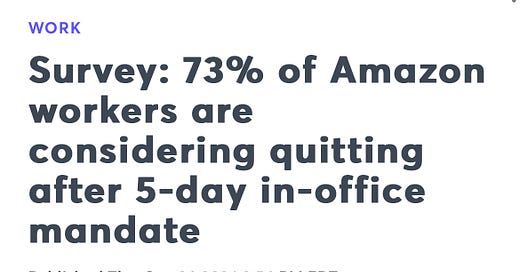New Season of The Floorplan, Work Trends, Ideas to Think Differently, Escaping Bureaucracy
And the Amazon 5 day a week return to office mandate....
The big headline about work in the past week has been Amazon’s mandate for a return to the office five days a week for the company’s corporate workers. There is so much I could say (and have said previously) about this, but I think this says most of it.
This is not a surprise.
Research has shown that mandates decrease engagement.
Arbitrary mandates will result in the loss of top talent.
Why are we still focussing on activity and face-time instead of effectiveness. Being in the office all day every day is not the best way to achieve top performance, and it isn’t necessary for the things that do benefit from face-to-face interaction.
Toxic Work Cultures
In 2022 I wrote this Op-Ed on work culture and the death of a young employee at EY a week after an EY director told me she had worked 65-hour weeks for over a year.
A story broke in the last few weeks on the death of a young EY employee in India
The descriptions of the work culture and the response from EY bore disturbing similarities to the 2022 event.
After I wrote the article, I had hundreds of employees of EY and other professional services firms write to me about their experiences of overwork, toxic work culture, bullying, and harassment. Tragically, I had several people write to me that their partners had committed suicide as a result of working in these environments.
News of the death of EY India employee Anna Perayil has sent shockwaves through India. Not a single EY employee attended her funeral.
As I wrote in the 2022 article:
"WFH is great. Mindfulness is wonderful. But none of these initiatives will address the root of many of the consequences of the design of modern work. A far bigger rethink is demanded.
If you are expected to work 65 hours a week in order to meet your KPIs, where you do it isn’t going to make much difference to the negative effects on your physical and mental health. If working 65 hours a week is still the entry ticket to participate high up the career ladder, then we have really made no progress at all."
New Season of The Floorplan Podcast
Matthew Webber and I are back with Season 3 of The Floorplan, a podcast about the future of work. In Episode 1, Matt and I ponder why modern organisations are almost always big on the idea of innovation but often really small on implementing the change required for it.
We also mention this article on the Oceangate tragedy as an example of where the wrong culture can lead .
We discuss a new study on the disconnect between innovation and business strategy and some interesting case studies with special guest Bond University Adjunct Lecturer in Entrepreneurship and Founder of The Accountant's Playbook Ben Hayden-Smith.
Listen to The Floorplan here.
Employees Seeking Adventure as a Key Career Driver
I recently joined ABC’s Triple J Hack to talk about changing work trends where employees are seeking fly-in fly-out careers for adventure as a key career driver.
You can listen back here:
Analogue, AI alternatives, and Ideas that Refresh our Brains
I was listening this morning to a podcast on work practices that mentioned Warren Buffet’s biggest work habit is reading around six hours a day.
This would be a literal dream for me.
My days are often too little filled with reading, writing, and interesting conversations, and are instead suffocated with often unimportant meetings and stifling bureaucracy.
Forever trying to find ways out of this for myself and all of you, I’ve just started reading The Utopia of Rules: On Technology, Stupidity and the Secret Joys of Bureacracy by David Graeber.
I mean, how could I not after reading the book’s description:
“Where does the desire for endless rules, regulations, and bureaucracy come from? How did we come to spend so much of our time filling out forms? And is it really a cipher for state violence?
To answer these questions, the anthropologist David Graeber-one of our most important and provocative thinkers-traces the peculiar and unexpected ways we relate to bureaucracy today, and reveals how it shapes our lives in ways we may not even notice...though he also suggests that there may be something perversely appealing-even romantic-about bureaucracy.
Leaping from the ascendance of right-wing economics to the hidden meanings behind Sherlock Holmes and Batman, The Utopia of Rules is at once a powerful work of social theory in the tradition of Foucault and Marx, and an entertaining reckoning with popular culture that calls to mind Slavoj Zizek at his most accessible.”
In the interests of detaching from online forms, AI permeation, and jarring dictates about efficiency at all costs, I have just purchased these beautiful, linked journals to start a commonplace book.
A commonplace book, often attributed to John Locke, and separate from a diary or travel journal, is a personal compilation of facts, ideas, quotes, and observations. It has a system of organisation to make it easy to find things under different headings. The serendipity between entries is often a surprise and delight.
I’ve kind of always done this, but with no plan or way of rediscovering the ideas, quotes or experiences that I write down in random journals and notebooks.
And yes of course I could do this in some highly efficient, keyword-searchable app, but honestly, I can’t think of anything less interesting.
A commonplace book from the 17th century.
If you are interested in how to set this up and the origin of the method, I loved this video from Oxford English Lit Masters student Ruby Granger.
And if you feel like you need some other century inspiration to get away from AI and bureaucracy, she has this real-time study along video from Oxford’s Duke Humfreys Library. It’s Oxford’s oldest library, opening in 1488, and might look familiar from the Harry Potter films.
As always, I’d love to hear what is and isn’t working for you at work.
Libby x








